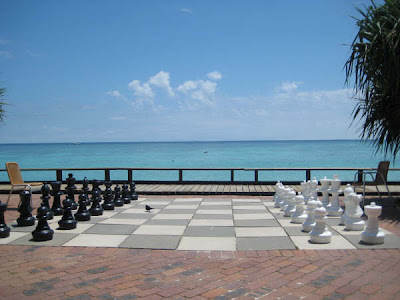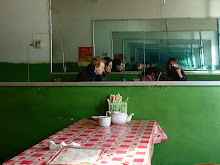
This photo by Ross Thomson, appears under a Creative Commons Attribution-Noncommercial-Share Alike 2.0 license.
This is the final part of my first interview with Jack. I have presented it in its original format, with Crystal's translation of my original questions left intact. Jack articulates some interesting ideas on how international students might be able to learn more about the lives of Melbourne locals and also offers some advice to newly arrived students.
Many international students find life in Melbourne to be quite boring, with not many social activities of interest. We’d like to hear your opinion on this matter?
In some ways this is true because we find it very difficult to become a part of the local social scene. What appears on the surface to be a friendly exchange of amenities does not necessarily signal that you have successfully integrated with local society. Sometimes this is a complex problem, incorporating cultural differences, language barriers and differences in habits and customs. However, if you want to resolve these issues there is only one way, and that is to stay here long enough. So for students who have just arrived, life can be very tough and lonely.
Have you ever attended any social activities or events in Melbourne, such as a sporting event, a music concert, a university club function or a church event?
As a matter of fact, I’d love to attend events like these but I wouldn’t have anyone to talk with. Normally the thought of going to something like that makes me quite nervous, after all I'm a stranger in a strange land. However I would probably adapt pretty quickly. A church meeting might be the best place for me.
Have you met any local Australian families or students?
The only family I’ve met were a Chinese family who immigrated to Australia around 20 years ago. We met on the plane trip to Australia. They sat down next to me and we chatted happily. The father had actually graduated from the university where I am about to commence my studies. After the plane landed they accompanied me to my new house and we have stayed in contact since then.
What do you feel is the greatest difficulty in adapting to life in Melbourne for international students?
Actually, the only real difficulty is the loneliness. Apart from this, most students find it relatively easy to adapt to life here.
If you could, what changes would you make to improve the quality of life for international students in Melbourne?
I feel that the Australian Government could establish more scholarships for overseas students. Also, I think we shouldn’t be viewed merely as consumers, give us more opportunities to contribute to society. For example, we could visit the homes of older local residents and do volunteer work. We don't expect young Australians will be that interested in making friends with overseas students, they are busy enjoying their own lives. Older people on the other hand are often just looking for someone to talk with.
Up until this point in time, what has been your best experience here in Melbourne?
I was walking along the beach at some bay, the name of which escapes me, picking up shells, enjoying the sun's rays and the gentle breeze. It felt so good. I thought to my self, this is truly living!
Overall, would you describe your experience of life in Melbourne as pleasant?
Yes, relatively pleasant. I find life here agreeable, the pace of life is very slow and I am free to do the things I want to do.


.JPG)




